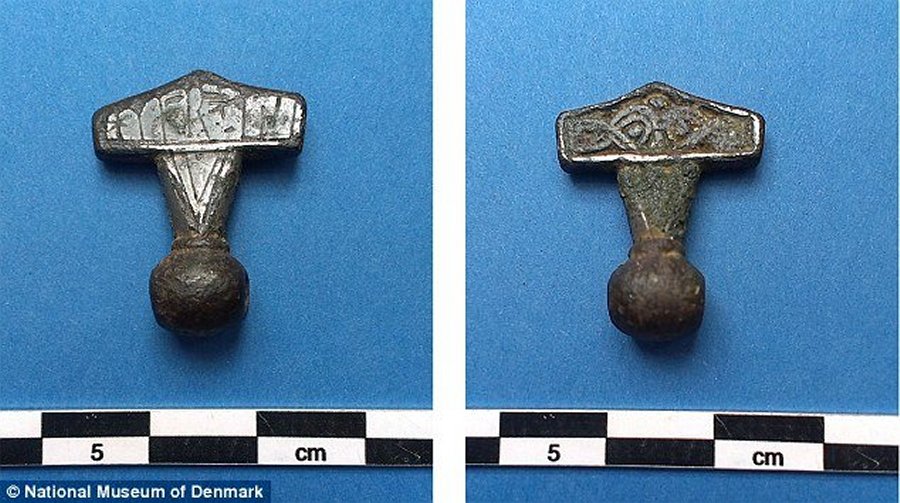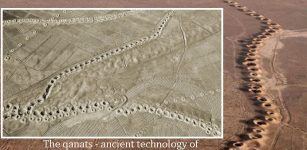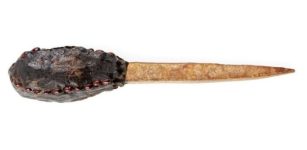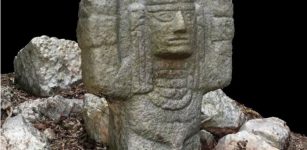One Of A Kind Viking Age Hammer Of Thor Discovered In Ysby, Sweden
Ellen Lloyd - AncientPages.com - The Hammer of Thor is frequently mentioned in Norse mythology as a valuable object that belonged to the mighty thunder God Thor.
Several Norse myths and legends describe the importance of Thor's ax-hammer hammer, Mjölnir, which was said to have magical powers. On one occasion, Thor lost his hammer and was just as frustrated as he was angry. This proud possession of his protected the Aesir Gods, and it was naturally vital to find the treasure as soon as possible.
A unique hammer of Thor was found in Ysby, Sweden. Credit: Patricia Torvalds/Sveriges Radio
Mjönir was held in such high regard that Vikings and ancient Norse people manufactured amulets made in the image of Thor's hammer.
Several years ago, scientists discovered an unusual hammer of Thor that could finally solve an ancient mystery.
Although thousands of Viking amulets similar to Thor's hammer had been found, no one knew what these objects represented, not until now.
Discovered in 2014, both sides of the Hammer of Thor amulet shown here with runes seen on the left image. Inscribed runes reads 'Hmar x is' (This is a Hammer'). Credit: National Museum of Denmark
Working with the National Museum of Denmark, archaeologists unearthed the unusual 10th-century amulet in Købelev on the Danish island of Lolland that could finally end the debate on how Thor's legend influenced Viking jewelry.
The find was unusual as it had runes inscribed that read 'Hmar x is' meaning 'This is a Hammer.'
Later, when Norse people converted to Christianity, objects of Pagan origin were avoided, but the worship of Norse gods did not vanish so quickly.
Many scientists were surprised when an amateur archaeologist and a 13-year-old student found an extraordinary Viking treasure connected to King Harald Bluetooth on the island of Rügen in the Baltic Sea in northern Germany.
King Harald Bluetooth converted the people of Denmark to Christianity, yet scientists discovered it seemed he did not abandon his adoration of the Norse gods.
Among the artifacts discovered on the island of Rügen was an amulet made in the shape of Mjölnir, known as the Hammer of Thor. This raised the question: Why did Christian Viking King Harald Bluetooth carry a hammer of Thor amulet?
Truth be told, many Vikings converted to Christianity because it had financial benefits when trading with foreign countries. Many Viking leaders, like Bluetooth, embraced the new religion but never wholly severed the connection to Norse gods.
Thor's Fight with the Giants (Tors strid med jättarna) by Mårten Eskil Winge (1872). Credit: Public Domain
The discovery of Viking Age objects is always exciting, and the latest find of a Hammer of Thor has made archaeologists in Sweden happy.
A surprising discovery was recently made in Ysby, a small village situated in Laholm Municipality, Halland County, Sweden.
The place has been known to archaeologists, but it's the first time they have unearthed a beautiful Hammer of Thor artifact manufactured in the late 900s.
Sveriges Radio (Swedish Radio) reported that the hammer is about 3 centimeters and made of lead. It is possible the Viking Age artifact was once gilded or silvered. However, this cannot be determined until the object has been properly cleaned. Preservation will help scientists to find traces of silver.
"The hammer of Thor that we found in Ysby has probably been worn as an amulet or a piece of jewelry. You can see a hole in the shaft where it may have been attached to a ring or strap. Several similar amulets have previously been found in Scandinavia, but this is so far the only one of its kind in Halland," Per Wranning from Kulturmiljö Halland said.
Per Wranning showing the discovered Viking Age hammer in Ysby. Credit: Patricia Torvalds/Sveriges Radio
Despite its age, the hammer still has noticeable signs. Wranning explained that the hammer of Thor increased in popularity during the late Viking Ages. It was most likely a manifestation and desire to not part with the Asatro, the worship of Norse Gods, when Christianity reached Scandinavia.
"Perhaps Thor's Hammer from Ysby was worn during a religious transition period when the area began to be Christianized. One theory is that these large, ornamented Norse hammers were a clear marker of those who still worshiped the gods associated with the Asatto when Christianity began to take root in Scandinavia," archaeologists from Kulturmiljö Halland explained.
The discovery was made when archaeologists examined an area where the municipality intends to build housing.
Previous archaeological excavations in Ysby have also been successful. There is scientific evidence people lived in this region long before the Viking Age. Among many things, archaeologists also unearthed "flint rejects, blackware (ceramics), and a metal fitting that could be from the Viking age or the early Middle Ages. There were also remains in the form of pits, potholes, and hearths. None of these facilities are yet dated using sample analyses, but the finds and the shape of some of the hearths possibly suggest a Viking Age dating at the site," archaeologists from Halland explained.
In the interview with SR Wranning also stated archaeologists had previously found ancient Roman silver coins at the site and longhouses from the early Iron Age, emphasizing Ysby is an exceptional place of historical and archaeological value.
See also: More Archaeology News
Despite the previous archaeological finds, it's evident Wranning and his team are happy about the latest discovery of Thor's hammer.
"It's really fun! I never expected we could find any ancient object like this one in Halland. It feels like it's time for a "bargain cake," Wranning joked.
Artigo original em inglês - aqui
Written by Ellen Lloyd – AncientPages.com
























